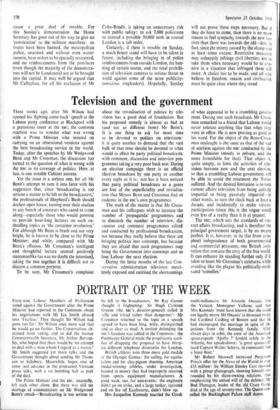PORTRAIT OF THE WEEK
Forty-nine Labour Members of Parliament voted against the Government after the Prime Minister had reported to the Commons about his negotiations with Mr Ian Smith aboard HMS 'Fearless.' They thought Mr Wilson had gone too far: Mr Wilson once more said that he would go no farther. The Conservatives ab- stained from voting, and so did the former Commonwealth Secretary, Mr Arthur Bottom- ley, who hoped that there would be 'no attempt to deal with a man whom I regard as a traitor.' Mr Smith suggested yet more talks and the Government thought about sending Mr Thom- son to Salisbury. Meanwhile, hopes rose of some real advance in the protracted Vietnam peace talks, with a us bombing halt as part of the deal.
The Prime Minister and the OK, unusually, left each other alone. But there was still no shortage of commentators 04 M,r Wedgwood Bean's attack—`Broadcasting is too serious to be left to the broadcasters.' Mr Ray Gunter thought it frightening: Sir Hugh Carleton Greene (the Roc's director-general) called it 'silly and trivial rather than dangerous': Mr Crossman returned to. the topic in a speech agreed to have been long, witty, distinguished and as clear as mud. A motion defending the one's freedom was tabled in the Commons: the Postmaster-General made the propitiatory sacri.- lice of dropping the proposal to have thirty- six different telephone directories for London.
British athletes won three more gold medals at the Olympic Games: for sailing, for equita- tation and for clay-pigeon shooting. American medal-winning athletes, under investigation, handed in money they had improperly received from sports equipment manufacturers. A good week, too, for non-events: the engineers didn't go, on, strike, and a large tanker, aground and, on fire off Eastbourne, (WO blow up.
Mrs Jacqueline Kennedy married the Greek multi-millionaire Mr Aristotle Onassis. For the Vatican, Monsignor Vallainc said that Mrs Kennedy 'must have known that she could not legally marry Mr Onassis' (a divorced man); but Cardinal Cushing of Boston said that he had encouraged the marriage in spite of ob- jections from the Kennedy family. After eleven days in orbit, the crew of the American space-capsule 'Apollo 7' landed safely in the Atlantic, but upside-down: 'a great spacecraft' (said Captain Walter Schirra, in command) 'but a lousy boat.'
Mr Robert Maxwell increased Pergamon Press's offer for the News of the World to over £33- million: Sir William Emsley Carr riposted with a group photograph, showing himself sur- rounded by his share-owning relations, thus emphasising the united will of the defence. Mr Bud Flanagan, leader of the old Crazy Gang, died at the age, of seventy-two. The Queen can- celled the Buckingham Palace staff dance.














































 Previous page
Previous page